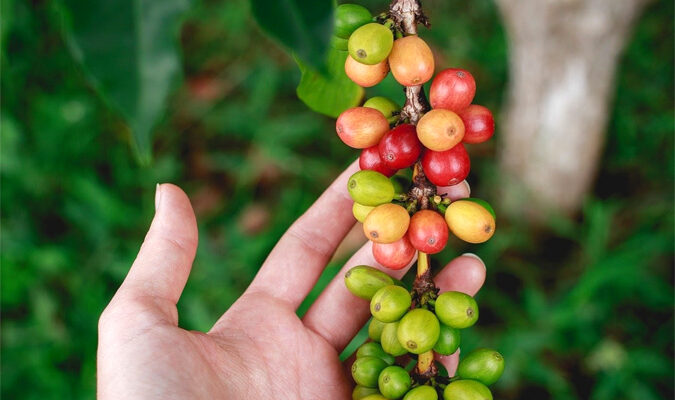
Over the past few years, organic food has gained widespread popularity. Whether or not you’re a health or fitness-conscious person, you will just find enough reasons that might convince you to switch to organic food and beverages.
Organic coffee is no exception to this fact. If you’re a coffee lover, you might have seen a lot of different brands with their line of organic coffees. So what is organic coffee and how is it different from conventional coffee?
Let’s find out.
What is Organic Coffee?
In the simplest of definitions, organic coffee is coffee that is grown without using any artificial or chemical-based fertilizers, pesticides, herbicides, additives, etc.
Having said that, if you’re out there in the market looking for the best organic coffee brands, the most important factor that you need to consider is the certification standard.
In the United States, the most widely accepted standard is ‘USDA Organic’, (by the United States Department of Agriculture). In order to be certified by the USDA, following criteria must be met:
Coffee Farming
As per USDA standards, farmers are required to use 95% organic ingredients during coffee farming. Natural fertilizers and bio-green substitutes such as mulch and compost can be used.
Coffee Processing
Coffee should be processed using only natural and sustainable techniques to achieve the organic label. This includes both dry and wet processing methods, however, dry processing is more common for organic coffee processing.
Coffee Roasting
Roasting process should also meet certain guidelines that require the coffee roasters to be kept free from any artificial or chemical-based substances.
Realistically speaking, there are a number of other elements that contribute towards the ‘organic’ label of coffee.
Organic VS Conventional Coffee
It is quite understandable for a beverage with production of more than 12 billion pounds per year, not to be solely produced under organic environments. Since there is a huge cost factor that comes into play, getting the organic certification and maintaining it can be really difficult for the farmers.
On the other hand, conventional coffee makes use of all the synthetic fertilizers, chemicals and other artificial elements that eases the production to meet the ever-increasing coffee demand around the globe. Yes, it does meet the global demand, but with less sustainable and environment-friendly mechanisms that are often overlooked.
As far as the taste and flavor is concerned, both organic and conventional coffee enjoy their fair share of the market with varying flavor profiles, sweet and bitter notes, or other coffee highlights that separates them.
Is Organic Coffee Healthier?
Since coffee, in general, has a lot of positive health impacts, drinking organic coffee is a healthier option to go for. So what are the health benefits? Let’s have a look..
Eco Friendly Techniques and Processes
Organic coffee-growing brands and farmers use methodologies that eventually protect and preserve our environment. A better environment automatically means a healthier lifestyle for us.
Since there is no use of toxic chemicals, herbicides, pesticides or any other harmful substance, the quality of soil and water within the farming vicinity and surrounding areas gets naturally better.
No Use of Artificial Substances
You don’t need any studies or research to prove that artificial substances and chemicals are harmful for your health. Organic coffee is free from all these artificial elements which makes it a more healthier choice.
Safe for Farmers
Despite having the right equipment or farmer suits, handling or administering animal sprays, pesticides and chemical-based fertilizers for longer periods can have serious health impacts on the farmers.
On the contrary, organic coffee-growing is healthier and safer for the farmers as they only come in contact with eco-friendly and chemical-free fertilizers or other coffee-growing ingredients.
Why Is All Coffee Not Organic Coffee?
After reading all the good things about organic coffee, you must be wondering by now why we even have inorganic coffee around us? Well, one of the major reasons is the cost factor.
Even though a number of small, family-owned farms might be growing coffee that is organic by nature, mainly due to the fact that they can’t use expensive pesticides, herbicides or other chemical-based fertilizers. Still, they might not have the organic certification as farmers in the poorer regions can’t pay for coffee inspections that are required for certifications.
Another downside to organic coffee farming is the inauthenticity associated with it. A number of poor countries do not have proper laws implemented to verify the organic nature of coffee. Corruption and bribery in these regions can easily put the organic certification of the entire production into jeopardy.
Lastly, as there are a lot of complex methods and processes involved in organic coffee-growing, meeting the rising global coffee demand can only be made possible with conventional coffee.
Our Final Thoughts on Organic Coffee
Keeping all the above factors into consideration, the all-important question is whether should you switch to organic coffee?
Well, the question that needs to be asked here is why shouldn’t you make the switch? The modern-day coffee brands do have their vast varieties of organic coffee beans that you can choose from, with all the different flavor and coffee aromas that will satisfy your taste buds.
Moreover, the health benefits, environmental impacts and farmers’ safety are big enough reasons for any coffee drinker to switch to organic coffee.
Leave a Reply